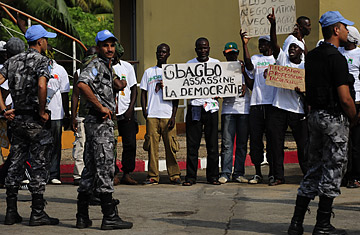
Supporters of Ivory Coast's internationally recognised leader Alassane Ouattara demonstrate, on December 28, 2010, at the Golf Hotel in Abidjan.
(2 of 2)
A troubling development in the Ivoirian crisis has been the recruitment of mercenaries from Liberia. President Ellen Johnson Sirleaf has warned against former combatants in her country's civil war crossing the border to fight in Ivory Coast. According to former commanders for Charles Taylor, Liberians fighters marginalized after the civil war there ended in 2003 are flocking to both sides of the crisis. Recruitment has split along ethnic lines, with members of Krahn tribe joining Gbagbo's forces and Gio and Mano fighters aligning with Ouattara. "Right now most of those guys are hungry: looking for job, looking for money," says a Liberian commander who chose not to join the mercenaries.
The Ivory Coast is a diverse nation of more than 20 million people, not only in terms of indigenous ethnic groups, but also with a large migrant population from neighboring countries like Burkina Faso, Mali and Liberia as well as large populations of Ghanaians and Nigerians. In the past, Ggabo has leveraged xenophobia against presumed "foreigners" to rally his base including an extremist militia allegedly tied to human rights abuses, the Young Patriots. "I don't like to present it in that light, but it's true, there's an ethnic alignment, there are people from the Southern part who are from Gbagbo's region and these are the ones now who are really controlling the army, " says the Ivoirian executive.
Diplomats, however, are cautious about the specter of another ethnic conflict in Africa. The State Department, for one, does not see an ethnic element to crisis. "This is not an ethnic issue; this is not a religious issue; this a political issue," Deputy Assistant Secretary Fitzgerald said.
But one political scientist living in Abidjan, also fearful to speak on the record, sees ethnic tension and politics as inseparable. "The political use of these grievances has exposed the problem in a disproportionate way and created resentment between the North and the South, eventually leading to the rebellion," he says.
There are signs of hope for elections the region. Guinea, which conducted its first democratic election in 50 years of independence, inaugurated President Alpha Conde last week after a fiercely contested runoff. The political parties in that election clung to ethnic lines — and there was scattered violence after the final results came in — but, the loser, Cellou Dalien Diallo, accepted the results paving way for a peaceful transfer of power. "The leadership is critical [for West Africa]" the Ivoirian executive says. "To have a political establishment that decides, no matter what happens they will put the country first... [then] we can defend ourselves against the leadership curse."
However, there are no such signs from Gbagbo. With his isolation, the situation for Ivoirians grows more desperate. Food prices in Abidjan have jumped with the skittish suppliers charging more to bring food into the capital. While one resident who spoke with TIME, noted a noticeable drawdown of military forces and roadblocks set up by Gbagbo's militia, the Young Patriots, gunshots still ring out through the night. Strategic locations — such as the TV station — remain heavily fortified by military positions. Last week, Gbagbo supporters blocked a United Nations convoy from investigating a location suspected of being a mass grave.
And, as the ECOWAS emissaries departed, Gbagbo made his position clear. An aide of the former president threatened to expel ambassadors for countries — including the United States, France and Nigeria — who have recognized his opponent.
The State Department viewed Gbagbo's statements as a sign of weakness, rather than strength. "He's making a lot of threats and I think he realizes that his time in office is limited and that the pressure's getting to him," said Fitzgerald.
